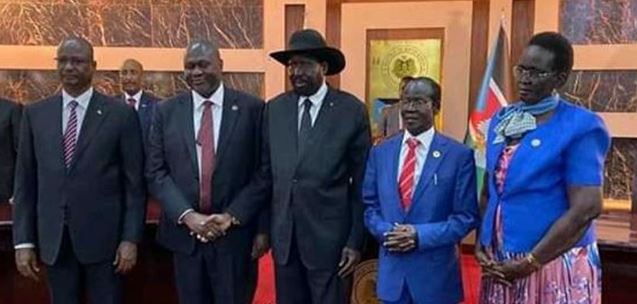A cross-section of South Sudanese are voicing growing concerns over the intentions of the Revitalized Transitional Government of National Unity (RTGoNU) as well as urging the leaders to provide clear guidance on the future direction of the country.
The central issue revolves around whether the government will extend the transitional period, hence extending its tenure, or proceed with democratic elections slated for December 2024 as stipulated in the 2018 revitalized peace agreement.
Speaking to Radio Tamazuj, Mach Garang, a concerned citizen, said leaders should be straightforward and avoid confusing the civil population on the status of the government, saying clarity is essential during these critical times.
“There is anticipation for elections to be conducted in the Republic of South Sudan so there should be clarity first on how elections can be conducted when some of the things have not been arranged appropriately,” Garang stated. “There is no security arrangement in place, there is no political space and there are no campaigns now. These are indicators of elections. The public should be given sufficient information about what is going on.”
Daniel Majok, echoing a similar opinion, said he is concerned about extending the transitional period, asserting that such a move would not be in the best interest of the nation.
“The government must clarify its stance to avoid confusing the civil population,” he urged. “Continuous extension of the transitional period is not healthy for our nation. We need clarity and a commitment to democratic processes.”
Majok said that he views the silence across the political divide as an indication that the leaders want to cling to power even if the citizens do not approve of their stay in power.
For his part, Deng-Bil William Aguer, the leader of the Africa People Congress (APC) Party, accused the transitional government of failing to fully implement the peace agreement over the past six years. He said the current government is making very little progress and therefore should immediately be dissolved and a lean administration of technocrats formed that he believes would pave the way for a genuine democratic election.
“Only 10 percent of the peace agreement has been implemented so far in 6 years. The current government has not delivered on its promises,” he stated. “It should be dissolved and a lean government of technocrats should be established to steer the nation towards credible democratic elections.”
Meanwhile, the Center for Peace and Advocacy (CPA) said in a statement on Tuesday that it is deeply concerned about the political leaders and parties’ unwillingness to reach a clear consensus on the country’s future.
“Many South Sudanese had hoped that the R-ARCSS would stabilize the country. To some extent, the peace agreement has been successful in reducing political violence. However, the agreement has faced a chronic lack of political will to fully implement its provisions. As a result, issues such as communal violence, food insecurity, human rights abuses, and inadequate social services continue to persist without a clear solution in sight,” the statement read in part. “The 2018 peace deal has been implemented selectively, with critical chapters such as Security Arrangements, Justice and Accountability, and Permanent Constitutional making being left largely untouched. Unfortunately, the parties involved in the agreement have been slow to act, which has disappointed many South Sudanese who had hoped for progress.”
According to CPA, six years after the signing of the peace deal in 2018, not even half of the document has been implemented by the parties involved. Multiple deadlines, including the recently expired Roadmap, have been missed.
“The leaders of South Sudan have consistently let down the people by failing to fulfill their promises. Consequently, ordinary citizens across the country continue to suffer in extreme poverty and face challenging security conditions. Inadequate social services have become a common issue,” it said, adding: “As the parties to the agreement decide on the next step for the country after the expiration of the Roadmap, the Center for Peace and Advocacy (CPA) calls on the parties to decide in the best interest of the citizens.”
“The statement added: “In the pursuit of peace, we urge leaders to promptly and harmoniously determine the future of the remaining tasks outlined in the peace agreement, which include elections, security arrangements, the creation of a permanent constitution, institutional reforms, and matters concerning justice and accountability. Since the Roadmap’s expiration, the country has eagerly awaited what comes next.”
The calls for transparency and adherence to democratic principles come at a critical juncture for South Sudan, a nation marred by years of conflict and political instability.
The RTGoNU, formed in February 2020 under the peace agreement, was tasked with laying the groundwork for democratic governance after years of civil war. However, progress has been slow, and citizens are growing increasingly impatient with the lack of tangible results.




